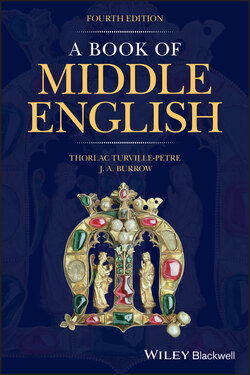Читать книгу A Book of Middle English - J. A. Burrow - Страница 102
Commentary
ОглавлениеThis is a representation of conversational language, though of a rather formal sort, so that colloquial reductions such as ‘isn’t’ may be appropriate in a translation. However, the Clerk addresses the Lord with the deferential plural ʒe, while the Lord replies with þou (see 5.4.1). There is no way of conveying this distinction in a Modern English translation, with the result that a significant feature of social register is lost. Trevisa writes in a South Western dialect, with spellings such as þeus, ‘these’, vor, ‘for’, and the form ham for ‘them’.
nedeþ, ‘is necessary’, is used as an impersonal verb (5.6.8). The Lord discourses at length on the notion of necessity (ll. 59–69). In early use katel means ‘property, wealth’. Livestock was one form of property, and OED gives a detailed account of the social factors that resulted in the sense‐development to ‘cattle’. In this context frendes probably has the sense ‘relatives’ rather than ‘friends’, though either is certainly possible here. In ON frændi means ‘relative’, and this sense was borrowed in Middle English (MED frend 4). vynde is ‘provide for, support’. In this dialect initial <f> is often voiced to <v>. This sense of find, quite common in this period, is today restricted to the phrase ‘all found’, meaning ‘with everything provided’. See OED find, senses 7–18.
